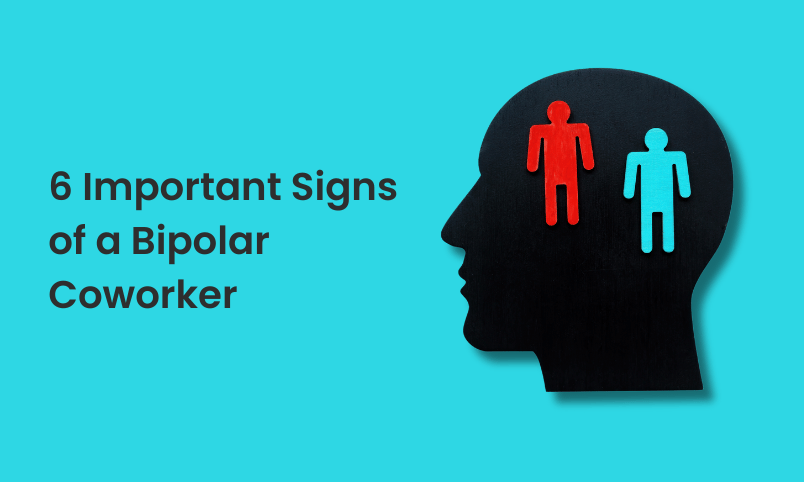By Esabda
Bipolar disorder is a mental health condition characterized by extreme mood swings, ranging from manic highs to depressive lows. Have you ever encountered someone with bipolar disorder in your workplace? Understanding these 6 signs of a bipolar coworker is crucial for creating a supportive work environment and promoting overall well-being.
According to the National Institutes of Health, bipolar disorder affects approximately 2.8% of adults in the United States, making it a relatively common mental health condition. When undiagnosed or unmanaged, bipolar disorder can lead to difficulties in various areas of life, including work. Therefore, recognizing the signs and symptoms of bipolar disorder in a coworker is crucial for both their well-being and the overall dynamics of the workplace.
Now, let’s dive into the article and discuss 6 important signs that you have to notice of your bipolar coworker.
6 Signs Your Coworker Has a Bipolar Disorder
Here are the 6 signs that you can observe in your coworker with bipolar disorder. Observing these signs lets you find the disorder in the first place, which let you help your coworker in time.
1. Recognizing the Signs of Bipolar Disorder
Bipolar disorder presents itself through distinct periods of mania and depression. By familiarizing yourself with the common symptoms and behaviors associated with bipolar disorder, you can better identify potential signs in a coworker.
Manic episodes
During a manic episode, individuals with bipolar disorder may display the following behaviors:
- Heightened energy levels and excessive activity
- Increased talkativeness and rapid speech
- Grandiose beliefs and inflated self-esteem
- Impulsive and risky decision-making
- Decreased need for sleep
Depressive episodes
Conversely, during a depressive episode, the following signs may be observed:
- Persistent sadness and feelings of hopelessness
- Loss of interest in previously enjoyed activities
- Fatigue, low energy, and difficulty concentrating
- Changes in appetite and weight
- Thoughts of self-harm or suicide
2. Observing Mood Swings and Energy Levels
One of the primary indicators of bipolar disorder is the presence of mood swings and energy fluctuations. These changes can occur rapidly and have a significant impact on a person’s daily functioning. You can identify bipolar coworker by properly observing their mood swings and energy levels.
Identifying frequent mood fluctuations
If you notice a coworker experiencing frequent and extreme mood swings, it might be a sign of bipolar disorder. They may seem elated and enthusiastic one moment, and then suddenly become irritable or despondent. These mood shifts can be intense and unpredictable, affecting their overall demeanor and interactions with others.
Noticing sudden bursts of energy or extreme fatigue
Individuals with bipolar disorder often exhibit periods of high energy during manic episodes. They may appear restless, engage in impulsive behaviors, and take on multiple tasks simultaneously. On the other hand, during depressive episodes, they may experience an overwhelming sense of fatigue and struggle to find motivation to complete even simple tasks.
3. Erratic Behavior and Impulsivity
Another sign that you can observe in your bipolar coworker is their erratic behavior and impulsivity. Bipolar disorder can manifest in impulsive and erratic behaviors, which can be noticeable in the workplace setting.
Impulsive decision-making and risky behavior
A bipolar coworker may engage in impulsive decision-making, often without considering the potential consequences. They might take on unnecessary risks, both personally and professionally. This impulsive behavior can lead to poor judgment, strained relationships with colleagues, and adverse outcomes on projects or tasks.
Difficulty maintaining focus and attention
Another sign of bipolar disorder is a noticeable difficulty in maintaining focus and attention. Your coworker might appear easily distracted, frequently shifting from one task to another, and struggling to complete assignments. This inconsistency in their work patterns can affect their productivity and the overall functioning of the team.
4. Communication Patterns and Social Interactions
Another important sign of bipolar coworkers is their communication patterns and social interactions. Changes in communication patterns and social interactions can provide valuable insights into identifying a bipolar coworker.
Rapid speech and racing thoughts
During a manic episode, individuals with bipolar disorder may exhibit rapid speech, talking excessively and quickly. They may jump from topic to topic, making it challenging for others to keep up with their conversation. This rapid flow of thoughts can also be accompanied by disjointed ideas or difficulty in expressing themselves coherently.
Social withdrawal or excessive sociability
Bipolar disorder can impact a person’s social interactions. Your coworker may exhibit periods of social withdrawal, isolating themselves from colleagues and avoiding social gatherings. Conversely, during manic episodes, they may display excessive sociability, seeking constant interaction and engaging in impromptu conversations. These extreme shifts in social behavior can be noticeable over time.
5. Performance Fluctuations and Productivity
Bipolar disorder can significantly affect an individual’s work performance and productivity, leading to inconsistencies and challenges in meeting deadlines. This is also one of the important signs of your bipolar coworker that you can notice over time.
Inconsistencies in work performance and output
A bipolar coworker may demonstrate significant fluctuations in their work performance. They might excel during manic episodes, displaying high levels of productivity, creativity, and generating innovative ideas. However, during depressive episodes, their performance may suffer, resulting in reduced productivity and difficulty meeting expectations.
Missed deadlines and unfinished projects
Due to the nature of bipolar disorder, your coworker may struggle with meeting deadlines and completing projects consistently. They may experience periods of intense focus and productivity followed by a lack of motivation and energy. This inconsistency can impact team dynamics, project timelines, and overall work quality.
6. Conflict Management and Emotional Outbursts
Bipolar disorder can contribute to challenges in conflict management and emotional regulation in the workplace.
Frequent conflicts and difficulty resolving them
A bipolar coworker may exhibit a higher tendency for conflicts with colleagues due to mood swings, irritability, or impulsive behavior. They might react strongly to perceived criticism or become defensive without apparent reason. Resolving conflicts and finding common ground might be more challenging for them, as their emotions can be intense and volatile.
Emotional outbursts and excessive irritability
During both manic and depressive episodes, individuals with bipolar disorder may experience emotional outbursts. They might display excessive irritability, becoming easily angered or frustrated over minor issues. These emotional fluctuations can disrupt the work environment and strain relationships with coworkers.
5 Ways to Help and Support a Bipolar Coworker

Here are five ways to help and support a bipolar coworker:
- Educate yourself: Take the initiative to learn about bipolar disorder, its symptoms, and how it can impact an individual’s work and daily life. This knowledge will help you understand their experiences and provide appropriate support.
- Offer empathy and understanding: Show compassion towards your bipolar coworker. Listen to their concerns without judgment and validate their feelings. Be patient and understanding during mood swings or challenging times.
- Encourage self-care: Support your coworker in prioritizing self-care. Encourage them to engage in activities that promote mental well-being, such as exercise, mindfulness, and seeking therapy or counseling if needed. Remind them to take breaks and practice stress-management techniques.
- Promote open communication: Create a safe and non-judgmental space where your coworker feels comfortable discussing their needs, challenges, and concerns. Encourage them to openly communicate any accommodations they may require or changes in their workload due to their condition.
- Collaborate on workload management: Help your coworker manage their workload effectively. Break tasks into smaller, manageable steps, offer assistance or collaboration when needed, and provide clear communication regarding deadlines and expectations. Flexible scheduling and allowing for breaks can also contribute to their productivity and well-being.
Remember, every individual’s needs may vary, so maintaining open lines of communication and adapting your support accordingly is essential. By offering understanding, empathy, and practical assistance, you can create a supportive work environment that helps your bipolar coworker thrive.
How do bipolar people act at work?
People with bipolar disorder may exhibit different behaviors at work depending on their mood state. During manic episodes, they may appear excessively energetic, and talkative, and engage in impulsive decision-making. They might take on multiple tasks simultaneously, display high productivity, and generate creative ideas.
However, during depressive episodes, they may struggle with low energy, lack of motivation, difficulty concentrating, and decreased productivity. Mood swings and inconsistent work patterns are common, and understanding these variations can help create a supportive and accommodating work environment for individuals with bipolar disorder.
Conclusion
Recognizing the signs of a bipolar coworker is crucial for creating a supportive and inclusive work environment. Let’s put your knowledge to the test! Share some of the common signs and behaviors you have observed or learned about regarding bipolar disorder. Understanding these symptoms will help you approach the situation with empathy and provide the necessary support to your coworker. What strategies do you think can be effective in encouraging self-awareness and promoting healthy coping mechanisms? Let’s brainstorm and share our ideas to foster a culture of understanding and support that contributes to the overall well-being and success of our coworkers!
Furthermore, remember that each person’s experience with bipolar disorder is unique, and flexibility in accommodating their needs is essential. By maintaining open communication and regularly checking in with your coworker, you can ensure that your support remains aligned with their evolving needs.
FAQs (Frequently Asked Questions)
Approach your coworker with empathy and respect, expressing your concern in a private and non-confrontational manner. Offer support and encourage them to seek professional help if they feel comfortable doing so.
Respecting confidentiality is essential. Unless there is an immediate risk to the individual or others in the workplace, it is generally best to maintain confidentiality and allow your coworker to disclose their condition on their own terms.
Bipolar disorder can impact an individual’s work performance due to mood swings, energy fluctuations, and difficulties in maintaining focus. However, with appropriate management and support, many individuals with bipolar disorder can excel in their jobs.
Also Read:
- Artificial Intelligence In Mental Health | Roles, Benefits, Applications
- Artificial Intelligence In Psychology | Applications And Trend




